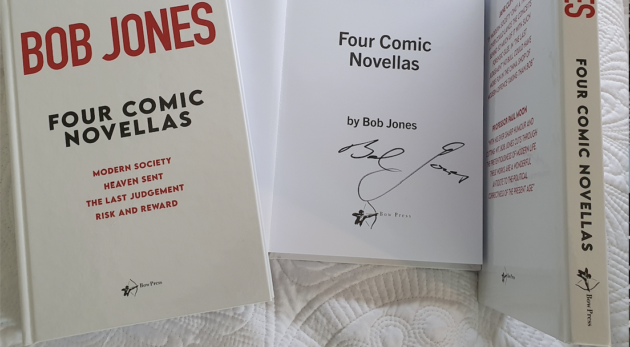OPINION
Bob Jones
Reading Stuff’s principal newspaper, Wellington’s The Post, I now treat as a daily entertainment for its blunders.


Worldwide, newspapers are going over like ninepins, sustained only because they’re a life-long habit by older generations. Most people under 35 have never as much held a copy, glued as they are to their brain-rotting, ironically so-called smart phones and their diverse idiotic but plainly addictive offerings.
The problem for print media relying on that aging demographic is the buggers keep dying off.
Some Post issues are virtually newsless and filled with advertising, often including farcical advertorials being passed off as news.
An example of the latter is a recent Post non-news article, doubtless paid by the real estate agent involved, and given major news item treatment, of the availability of some (unsurprisingly) empty houses on Stewart Island. I doubt Air New Zealand will be putting on extra flights to cope with the hordes of eager buyers. The island’s tiny population says everything about its appeal.
The most amusing aspect of this was the bold caption referring to “Stuart Island”, this abominable ignorance repeated with the photo caption.
That reflects Stuff’s constant staff reductions with skilled personnel being replaced by lower paid, otherwise unemployable nincompoops.
Journalists are not highly paid but are traditionally part compensated by baubles, namely the prefix “award winning” before their name. But that once meaningful accolade has been diminished by virtually everyone receiving it.
Now Stuff has come up with a fresh gimmick. Today seemingly everyone has an “editor” prefix.
Recently, one of their new faux editors contributed an article on swimming dangers and began a sentence, “me and…” It’s bloody unbelievable.
Last week it carried a heading on its website; “Fashion retailers banking on “an” Taylor Swift boost.
These disasters reflect the grammar level of a drunken drainlayer, aside from which it’s a ridiculous assertion as the Swift woman can apparently only bawl into a microphone if in her underwear. Presumably, the claimed fashion retailers are hoping that all women get about in their underwear, a terrifying prospect in the capital in which the average female has a stripped fighting weight of about 300lbs.
So how does The Post survive? That’s easy. Dependent on an older generation of habitual readers it’s the perfect advertising medium for the booming cruise ship industry and carries a huge volume of cruise advertising.
The typical cruise ship passenger is a retiree, in other words, a habitual newspaper reader. Accordingly, The Post also scores well with the thriving retirement village industry targeting the same age group.
Apart from the life-long newspaper reading habit, another “attraction” for this age group are the death notices, these avidly read for obvious reasons.
But advertising aside, The Post is almost devoid of local news. The free-site Scoop run more local news every day than the Post carries in a week, it instead filling its pages with columnists, all boringly predictable apart from Josie Pagani and Damien Grant who are both outstanding. It certainly doesn’t help itself with this demographic filling its pages with absurd Maori wonderfulness guff.
On a plus note The Post layout is impressively crisp and far superior to the NZ Herald’s.
It also hugely outguns the Herald with its range of crosswords and other such word games which older folk have the time to indulge in.
Finally, our print media also scores well with numerous pages of commercial real estate adverts, these mainly small industrial and retail buildings which this demographic buys.
So is Stuff stuffed?
Ultimately yes with their print media as their current readership dies off and will not be replaced by the next generation for whom ironically so-called smart phones are an addiction for all info’ on everything. I say ironic given the overwhelming evidence of their dumbing down effect.
Stuff is now trying to emulate the Herald and develop an online subscription service, hard work with an older generation as a target plus the competition from easily created online local news-services such as Scoop. Time will tell but The Herald’s ownership company, which also includes half New Zealand’s commercial radio stations latest results make grim reading.
For running such a large organisation over the last year they averaged a lousy $200,000 profit per week.
As an aside the regrettable (to me) collapse in the print media is not confined to newspapers but is also hitting magazines hard as well.
Some such as The Economist, which up to a decade back rated as blue as a blue chip asset could be, is seeing a decline, this reflected in hitherto unknown sloppy reporting. A recent Economist article on American political polls included this “…that compares with a 0.2% lead…” That appalling grammatical error would have been inconceivable five years back. So too with numerous other long-established magazines, all it would sadly seem at the early death spiral stages, as with newspapers.
BUY Your Own Copy of Sir Bob’s Latest Book Today.


